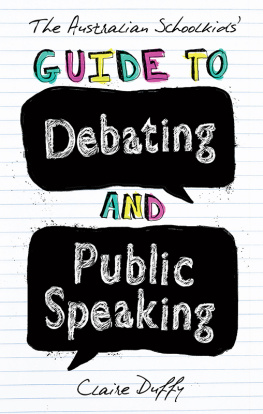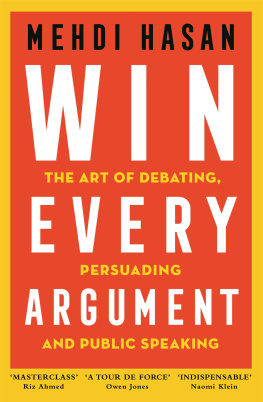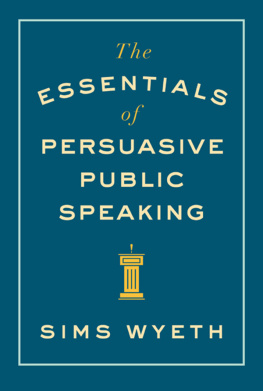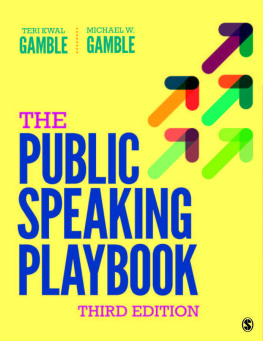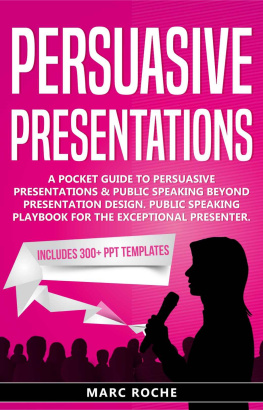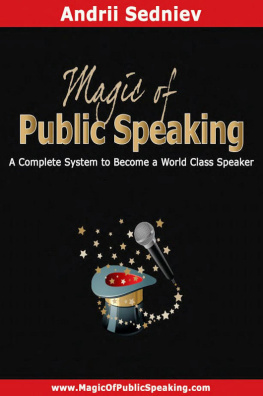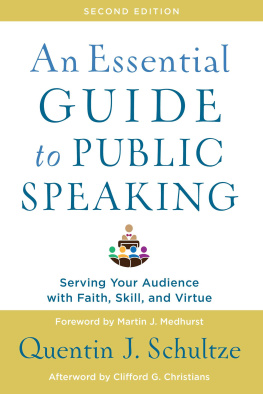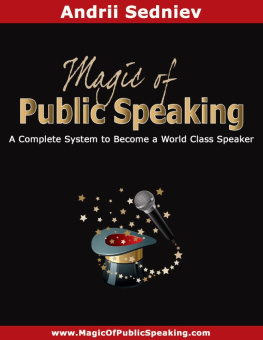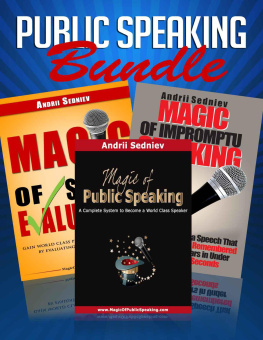My biggest thanks are to my daughter Eleanor, whose contributions to this book are massive. Her experience as a debater and coach is vast, and there would be no book without it. I also thank my husband, Michael, who has impressive speaking skills of his own and who gave me great advice and insights.
Next come the educators. Sandra Carter is, quite simply, a legend, a role model, and an inspiration to me and generations of her speech students. Thanks to SCEGGS Darlinghurst, where I got started in this field, and to The Scots College especially Andrew Potter for giving me and the debating and public speaking program unreserved support.
Students would not be doing any of this if it were not for the programs and the infrastructure that support them. Every school debating and public speaking coordinator deserves a pat on the back for their efforts. I especially want to thank Lloyd Cameron of the Arts Unit of the New South Wales Department of Education and Communities, whose leadership over many years has created an outstanding schools speaking culture. The program fosters both participation and excellence and has had an enormous influence on thousands of school students. As a result, we have an exceptional standard of speaking.
I also want to thank all the students Ive coached over the years. You are original, interesting, passionate, clever, and absolutely never dull. Spending time with you is the best job a person could wish for.
Contents
What Is Debating?
How It Works
Rules and Judging
What Are We Fighting For?
What Is Argument?
How It Works: Introducing Logic, Premises, and Fallacies
The Persuasive Power of Reasons
Topics and How to Treat Them
Introducing Stakeholders
How to Start Your Case Prep
Preparing Should Topics
Preparing Is Topics
Who Says What: The Allocation, Case Division, or Split
What Are Rights?
Who Has Rights?
Where to Draw the Line? What Line to Draw?
Rights and Harms in the Balance
Handling Rights and Harms Debates
The Toolkit for Change
The PREP Approach
What Not to Do
Rebuttal Basics
Thematic Rebuttal
Finding the Flaws in the Other Teams Arguments
How to Prepare Rebuttals
Presenting Rebuttals Properly
Using PREP to Argue and to Rebut
First Speaker
Second Speaker
Rebuttal Speeches
What to Do in Prep
Room Set-Up
On Your Feet!
Taking Notes While Those All Around You Talk!
Team Table Manners
The Moderator, Timekeeper, and Adjudicator
Whats Involved?
Nuke Those Nerves!
Lessons from a Wise Old Greek
Six Things to Think About When Preparing to Speak
1. Research Your Subject
2. Find the Key Ideas
3. Decide on the Take-Away Message
4. Develop the Script
5. Write the Draft
6. Rehearse
Making the Most of Your Voice
Poise on the Podium
Public Speaking Competitions
Impromptu Speaking Tips for Thinking on Your Feet
Events and Ceremonies
Ms. Duffys (Complete) Debating Cheat Sheet
All-Purpose Speech Planner
Persuasive Speech Plan
Informative Speech Outline
Ms. Duffys Five-Minute Impromptu Speechmaker
Introduction
Welcome! I am delighted that youre reading this book, and that you plan to master the mysterious arts within it.
My own debating and public speaking career started in my first year at high school. I hadnt made it into a sporting team (then or ever, as it turned out) so I tried out for a public speaking competition. At the end of my speech the teacher leaned across the desk, and, frowning at the twelve-year-old me, said I was one of the best speakers shed ever heard. Its possible I was the only speaker shed ever heard (no one else was trying out), but the flattery worked. I was hooked.
It was practically the Pleistocene era. In those days you could do debating and public speaking at school, but neither of them was taught. We had to figure it out for ourselves. On Fridays my debating team used to squash into the back of a teachers car to get to schools nearby, where we lost a lot. Eventually we learned that our opponents were being coached by the adjudicator! (There was only one in our whole region.) So who knew if we were really any good or not. I left school thinking we might have been hopeless, and I was much too nervous to try university debating.
My interest flared again as a mom. My daughter loved debating. Well, loved is a bit of an understatement. You couldnt stop her. For years the high point of our familys week was debating, with added thrills if a public speaking competition was on. These were exciting times. We livened up, had a focus, and an interest we all shared. We became very good at arguing with each other. We made friends with the parents and kids from other schools who shared the same passion. My daughters horizons expanded through learning how the world works, and thinking about whats right and good, and whats not and why. She went to new places and met new people. I enjoyed it so much that I asked her school principal if they could use any help, and the answer was yes. Pretty soon I was coaching a group of grade elevens. Soon I was coaching junior teams as well, and then I was coaching in several schools, and then I was in charge of a whole competition, working with dozens of people to make sure that debating was the highly valued and enjoyable experience it can be. Now its my full-time job.
Meanwhile, my daughter became very, very good at it. She represented Australia in both debating and public speaking, and shes got a blazer with a gold Australian Coat of Arms on the pocket (you need the prime ministers okay for that!). At the World Schools Debating Championships, she and her team were ranked as the top four speakers in the world.
These days, you dont take up debating and public speaking because youre no good at sports; its cool to be one of the speaky kids, and its organized properly. Anywhere in your country you can take part in a well-run competition. Most schools have dozens of students in debating. Oral presentations happen in class all the time, and for the more enthusiastic, there are external public speaking competitions. Adjudicators are trained, and a network of teachers and coaches help you get to a high standard.
As a parent and a teacher I know that debating and public speaking are the gateway to great enrichment, not just for you but for those around you. What you learn will include some of the most important things you ever learn. You will love exploring big issues, seeing into real-life dilemmas, and exercising your powers of self-expression.
Debating is excellent brain training. It sharpens your wits, teaches you how to reason, to think on your feet, to explain and justify a position, and to scour somebody elses work for flaws. It helps you see that whatever your personal beliefs, there is merit in the two sides of most arguments, and you must be able to justify yours. You will use this ability often, from answering exam questions, to later in real life, when it will help you do well at university and in the workplace.
Public speaking gives you space to be an individual, to say things that are original and off the beaten track of the school curriculum. There is no need to prove a point or demonstrate that you know the answer to a question. You can follow your own interests and present issues just because they matter to you. You will gain confidence as you formulate your ideas and speak them aloud. Its a rare opportunity. Young people are not often given the freedom to say, This is interesting because or We could fix this problem if we tried this
Both these pastimes teach you to engage with an audience and present information in a way that people want to listen. Most adults wish they could do this! Its also great fun. You will feel a thrill as you get the hang of it.


